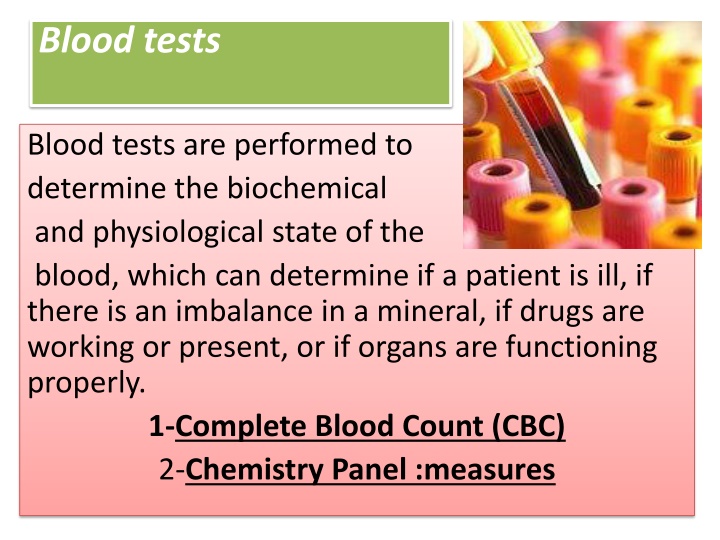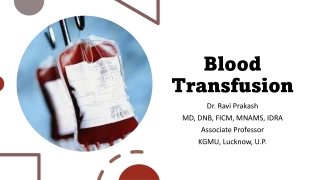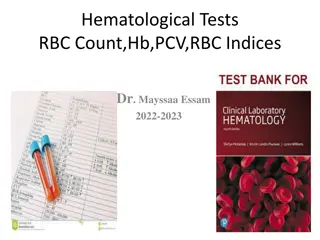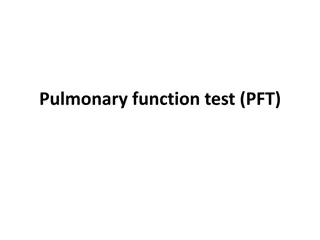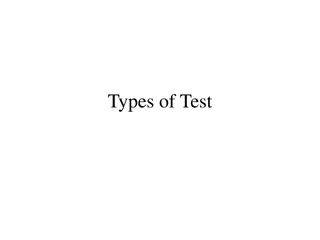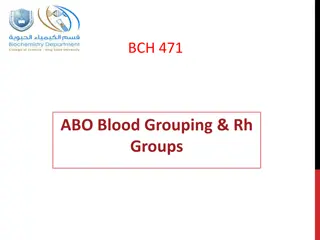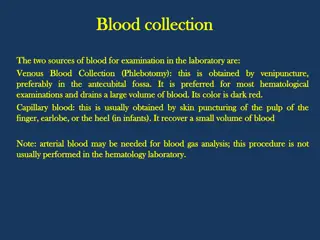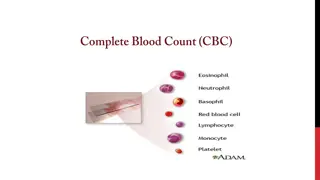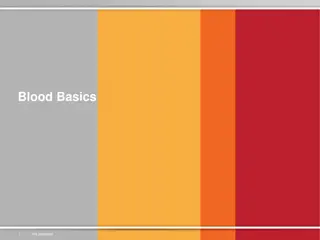Blood Tests: Importance and Types
Blood tests are crucial for diagnosing illnesses, monitoring conditions like diabetes, checking organ function, and assessing drug effectiveness. They include Complete Blood Count (CBC), Chemistry Panel, blood glucose tests, HbA1c test, kidney function tests, liver function tests, and cardiac enzyme tests. Each test serves a specific purpose in evaluating an individual's health status.
Download Presentation

Please find below an Image/Link to download the presentation.
The content on the website is provided AS IS for your information and personal use only. It may not be sold, licensed, or shared on other websites without obtaining consent from the author.If you encounter any issues during the download, it is possible that the publisher has removed the file from their server.
You are allowed to download the files provided on this website for personal or commercial use, subject to the condition that they are used lawfully. All files are the property of their respective owners.
The content on the website is provided AS IS for your information and personal use only. It may not be sold, licensed, or shared on other websites without obtaining consent from the author.
E N D
Presentation Transcript
Blood tests Blood tests are performed to determine the biochemical and physiological state of the blood, which can determine if a patient is ill, if there is an imbalance in a mineral, if drugs are working or present, or if organs are functioning properly. 1-Complete Blood Count (CBC) 2-Chemistry Panel :measures
Chemistry Panel A-blood glucose Blood glucose tests are also sometimes called blood sugar done as: *Fasting blood suger test. *oral glucose tolerance test, abbreviated as OGTT or GTT. For this test patient fast, then have a blood sample taken, then drink glucose, then have a number of samples taken over a few hours. They are usually used to check for or monitor diabetes. The standard blood glucose tests measure blood sugar level at a particular time. The OGTT measures respond to glucose.
Chemistry Panel #Pregnant women can develop a particular type of diabetes called gestational diabetes, and might be asked to have an OGTT around 28 weeks of pregnancy. Gestational diabetes usually goes away after the baby is born. *HbA1c test HbA1c is a blood test that is used to help diagnose and monitor people with diabetes. It is also sometimes called a haemoglobin A1c, glycated haemoglobin or glycosylated haemoglobin.HbA1c refers to glucose and haemoglobin joined together (the haemoglobin is glycated ).
Chemistry Panel Red blood cells live for up to 4 months, so HbA1c gives an indication of how much sugar in blood over the past few months. It s different to the blood glucose test, which measures how much sugar in blood at that moment.It can used to diagnose diabetes diabetes has been controlled over the last few months.. Higher of HbA1c, mean greater risk of developing complications such as problems with your eyes and kidneys. and indicates how well
Chemistry Panel Kidney function tests Kidney tests are very important for people who have diabetes, high blood pressure or heart disease.the most important tests: Creatinine and urea in blood& Electrolytes in blood usually sodium, potassium, chloride or bicarbonate Liver function tests Liver function tests (also called LFTs) are blood tests that can provide information about liver working. They test the levels of a number of proteins and enzymes that are either produced by liver cells or released into the blood when liver cells are damaged
Chemistry Panel Cardiac enzymes cardiac enzyme tests, can check whether the heart muscle is damaged, and indicate if a person has had a heart attack.The most common test is troponin. This test has replaced other cardiac enzyme tests previously done (total cholesterol, HDL (high-density lipoprotein), LDL (low-density triglycerides, and the total cholesterol/HDL ratio, as it is more accurate. lipo-protein),
Chemistry Panel Troponin is a protein found in the heart muscle. When the heart muscle is injured, troponin is released into the bloodstream and the level that can be detected goes up. This can happen during and after a heart attack. Often the test will be done more than once to monitor for damage.
Common Blood Test Codes Blood Test Code Definition This is one of the most common tests administered, which measures the cell count in the blood and the ratios and weights of blood components by comparing white and red blood cell counts, hemoglobin, hematocrit, and corpuscular volume.. It helps doctors determine if a patient is affected by infection, anemia, blood cancers, immunity issues, or platelet problems. CBC: Complete Blood Count
Common Blood Test Codes This series of tests is used to measure chemicals present in the blood. The test is administered on the plasma and measures electrolyte levels, glucose, calcium, and other chemicals. It is used to determine a patient s overall health and if there are any underlying imbalances causes various health problems. BMP: Basic Metabolic Panel
Common Blood Test Codes This measures an enzyme in your body that is produced when the heart is injured. This test is used when a patient has a heart attack. It indicates the severity of the heart attack. CK: Creatine Kinase Tests
Common Blood Test Codes This tests measures the amount of bad (LDL) and good (HDL) cholesterol in the blood. LDL and HDL If results are out of the normal, doctor will likely suggest dietary changes and potentially cholesterol medication.
Common Blood Test Codes This test measures how much protein in the blood which indicates if a patient has inflammation and is at risk for a heart attack. CRP: C- Reactive Protein Test Result can be used to encourage a patient to make lifestyle changes to reduce his or her risk.
Common Blood Test Codes This measures an enzyme found in the blood that rises when an injury occurs in the body s tissue or an organ. It helps a doctor determine if there are internal injuries. AST: Asparate Aminotransferase
Common Blood Test Codes This test is used to diagnose thyroid disorders, such as when the thyroid is underactive or there is a problem with fertility. TSH: Thyroid Stimulating Hormone Test
